|
|
|
Sort Order |
|
|
|
Items / Page
|
|
|
|
|
|
|
| Srl | Item |
| 1 |
ID:
139804
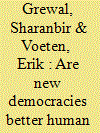

|
|
|
|
|
| Summary/Abstract |
Recent scholarship finds that new democracies are more likely than established democracies to make binding commitments to international human rights institutions. Are new democracies also better at following through on these commitments? Stated differently, does their greater willingness to join international institutions reflect a genuine commitment to human rights reform or is it just “cheap talk?” We analyze this question using a new data set of more than 1,000 leading European Court of Human Rights (ECtHR) cases. Since new democracies face judgments that are more difficult to implement than established democracies, we employ a genetic matching algorithm to balance the data set. After controlling for bureaucratic and judicial capacity, we find that new democracies do implement similar ECtHR judgments initially more quickly than established democracies, but this effect reverses the longer a judgment remains pending. Although new democracies have incentives to implement judgments quickly, they sometimes lack checks and balances that help ensure implementation should an executive resist.
|
|
|
|
|
|
|
|
|
|
|
|
|
|
|
|
| 2 |
ID:
139802


|
|
|
|
|
| Summary/Abstract |
Donor proliferation and the fragmentation of aid delivery is an important problem besetting foreign aid policy. Increased donor coordination is widely seen as a fix to this problem. This article explores theoretically and empirically the collective action problems and incentives that donors face when coordinating their actions, based on the distinction between private and public goods properties of aid. I introduce the concept of lead donorship, develop a measure that accounts for the exclusive and long-lasting ties between a lead donor and a recipient country, and show that lead donorship is in long-term decline. I test my theory combining spatial autoregressive (SAR) models, nonparametric model discrimination techniques, and data on aid delivery channels. I recover evidence of collusion in the provision of private goods aid in the presence of a lead donor, and lack of coordination and competition in the absence of a lead donor.
|
|
|
|
|
|
|
|
|
|
|
|
|
|
|
|
| 3 |
ID:
139798
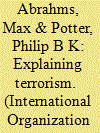

|
|
|
|
|
| Summary/Abstract |
Certain types of militant groups—those suffering from leadership deficits—are more likely to attack civilians. Their leadership deficits exacerbate the principal-agent problem between leaders and foot soldiers, who have stronger incentives to harm civilians. We establish the validity of this proposition with a tripartite research strategy that balances generalizability and identification. First, we demonstrate in a sample of militant organizations operating in the Middle East and North Africa that those lacking centralized leadership are prone to targeting civilians. Second, we show that when the leaderships of militant groups are degraded from drone strikes in the Afghanistan-Pakistan tribal regions, the selectivity of organizational violence plummets. Third, we elucidate the mechanism with a detailed case study of the al-Aqsa Martyrs Brigade, a Palestinian group that turned to terrorism during the Second Intifada because pressure on leadership allowed low-level members to act on their preexisting incentives to attack civilians. These findings indicate that a lack of principal control is an important, underappreciated cause of militant group violence against civilians.
|
|
|
|
|
|
|
|
|
|
|
|
|
|
|
|
| 4 |
ID:
139799
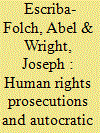

|
|
|
|
|
| Summary/Abstract |
Do human rights prosecutions deter dictatorships from relinquishing power? Advances in the study of human rights show that prosecutions reduce repression in transition countries. However, prosecuting officials for past crimes may jeopardize the prospects of regime change in countries that have not transitioned, namely dictatorships. The creation of the International Criminal Court has further revitalized this debate. This article assesses how human rights prosecutions influence autocratic regime change in neighboring dictatorships. We argue that when dictators and their elite supporters can preserve their interests after a regime transition, human rights prosecutions are less likely to deter them from leaving power. Using personalist dictatorship as a proxy for weak institutional guarantees of posttransition power, the evidence indicates that these regimes are less likely to democratize when their neighbors prosecute human rights abusers. In other dictatorships, however, neighbor prosecutions do not deter regimes from democratizing.
|
|
|
|
|
|
|
|
|
|
|
|
|
|
|
|
| 5 |
ID:
139797
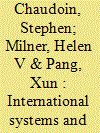

|
|
|
|
|
| Summary/Abstract |
Following older debates in international relations literature concerning the relative importance of domestic versus systemic factors, newer debates emphasize interdependence among states and the complex interactions between systemic and domestic factors. As globalization and democratization advance, theories and empirical models of international politics have become more complicated. We present a systematic theoretical categorization of relationships between domestic and systemic variables. We use this categorization so that scholars can match their theory to the appropriate empirical model and assess the degree to which systemic factors affect their arguments. We also present two advances at the frontier of these empirical models. In one, we combine hierarchical models of moderating relationships with spatial models of interdependence among units within a system. In the other, we provide a model for analyzing spatial interdependence that varies over time. This enables us to examine how the level of interdependence among units has evolved. We illustrate our categorization and new models by revisiting the recent international political economy (IPE) debate over the relationship between trade policy and regime type in developing countries.
|
|
|
|
|
|
|
|
|
|
|
|
|
|
|
|
| 6 |
ID:
139796


|
|
|
|
|
| Summary/Abstract |
Does improved communication provided by modern cellphone technology affect the rise or fall of violence during insurgencies? A priori predictions are ambiguous; introducing cellphones can enhance insurgent communications but can also make it easier for the population to share information with counterinsurgents and creates opportunities for signals intelligence collection. We provide the first systematic micro-level test of the effect of cellphone communication on conflict using data on Iraq's cellphone network (2004–2009) and event data on violence. We show that increased mobile communications reduced insurgent violence in Iraq, both at the district level and for specific local coverage areas. The results provide support for models of insurgency that focus on noncombatants providing information as the key constraint on violent groups and highlight the fact that small changes in the transaction costs of cooperating with the government can have large macro effects on conflict.
|
|
|
|
|
|
|
|
|
|
|
|
|
|
|
|
| 7 |
ID:
139801
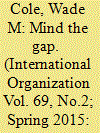

|
|
|
|
|
| Summary/Abstract |
According to recent studies, international human rights treaties are ineffective, counterproductive, or else beneficial for only those countries that tend to respect human rights regardless of treaty membership. Analysts often attribute gaps between human rights principles and practices to willful disobedience, self-interested defection, and ineffective enforcement. Using two-stage regression models to analyze compliance with the International Covenant on Civil and Political Rights, I examine whether countries' inability (as opposed to unwillingness) to implement treaty terms is also responsible for the gap between commitment and compliance. I find that one dimension of state capacity in particular—bureaucratic efficacy—enhances levels of compliance with civil, political, and physical integrity rights provisions. These findings lend credence to an important aspect of the managerial approach—that noncompliance is often inadvertent and conditioned by a state's ability to implement treaty terms.
|
|
|
|
|
|
|
|
|
|
|
|
|
|
|
|
| 8 |
ID:
139803
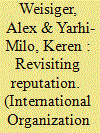

|
|
|
|
|
| Summary/Abstract |
Policy-makers and political scientists have long believed that states must make policy with an eye to maintaining a good reputation, especially a good reputation for resolve. Recent work, however, has argued that reputations for resolve do not form, and hence that past actions do not influence observers' behavior in subsequent interactions. This conclusion is theoretically problematic and unsupported by the evidence offered by reputation critics. In particular, juxtaposing reputation for resolve to power and interests is misleading when past actions influence observers' beliefs about interests, while the common approach of looking at crisis decision making misses the impact of reputation on general deterrence. We thus derive hypotheses about conflict onset from both the arguments of reputation critics and the logic of more standard reputation arguments, which we put to statistical test. We find that past action is closely connected to subsequent dispute initiation and that the effects of reputation generalize beyond the immediate circumstances of the past dispute. Although reputation is not all-important, leaders are well advised to consider the reputational implications of policy decisions in international conflict.
|
|
|
|
|
|
|
|
|
|
|
|
|
|
|
|
| 9 |
ID:
139800
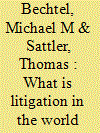

|
|
|
|
|
| Summary/Abstract |
Conventional wisdom holds that the creation of international, court-like institutions helps countries to peacefully settle trade conflicts, thereby enhancing overall welfare. Many have argued, however, that these institutions remain ultimately ineffective because they merely reflect the distribution of power in the anarchic international system. We argue that international litigation provides economic spillovers that create opportunities for judicial free-riding and explore empirically how litigation in the World Trade Organization affects bilateral trade between countries involved in a trade dispute. We use a matching approach to compare the dynamics of trade flows between countries that experienced a panel ruling with trade relations of observably similar country pairs that did not experience a ruling. Based on this comparison we find that sectoral exports from complainant countries to the defendant increase by about $7.7 billion in the three years after a panel ruling. However, countries that have proactively filed a complaint and carried the main costs of litigation do not systematically gain more than less-active third parties that merely joined an existing trade dispute. This suggests that international judicial institutions can provide positive economic externalities and may thereby lead to a less power-based distribution of the gains from trade.
|
|
|
|
|
|
|
|
|
|
|
|
|
|
|
|
|
|
|
|
|